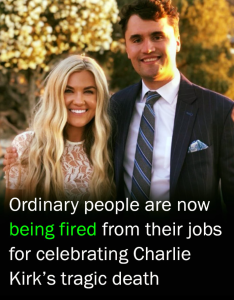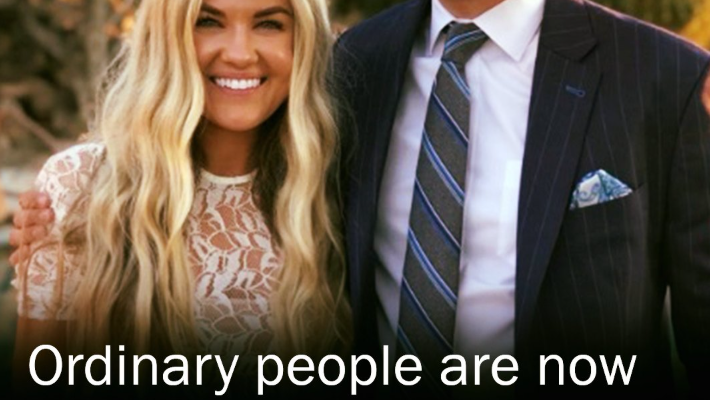
The assassination of Charlie Kirk, a polarizing conservative activist and founder of Turning Point USA, has ignited a firestorm of political, cultural, and professional consequences across the United States. While the tragedy itself has drawn widespread condemnation, a secondary wave of fallout is now sweeping through workplaces, schools, and public institutions: individuals who publicly celebrated Kirk’s death—whether through social media posts, memes, or offhand remarks—are facing termination, disciplinary action, and public shaming.
This moment is not just about one man’s death. It’s about the volatile intersection of free speech, political polarization, and the ethics of public expression in a nation increasingly defined by ideological warfare.
🎯 Who Was Charlie Kirk?
Charlie Kirk was a towering figure in right-wing youth politics. He co-founded Turning Point USA in 2012, a conservative nonprofit that rapidly expanded its influence across college campuses. Known for his combative style, Kirk built a media empire through his podcast, social media presence, and campus debates. He was a close ally of President Donald Trump and a vocal critic of progressive movements, often making incendiary remarks about marginalized communities.
Kirk’s assassination at Utah Valley University during a speaking event was a shocking act of political violence. The suspect, Tyler Robinson, reportedly confessed to the crime and is now facing potential capital charges. The killing has been widely condemned, even by Kirk’s harshest critics, as a tragic and unacceptable escalation of political hostility.
💥 The Celebration Backlash
In the hours following Kirk’s death, social media lit up with reactions—some mournful, others disturbingly gleeful. Teachers, firefighters, university staff, military personnel, and even a U.S. Secret Service agent were among those who posted celebratory or mocking messages online. Screenshots of these posts—ranging from “Another racist man popped 🍻” to memes trivializing the assassination—quickly circulated, prompting outrage from conservative circles and calls for accountability.
Defense Secretary Pete Hegseth announced that the Pentagon is “tracking closely” any civilian or military employees who celebrated the murder. Republican lawmakers have demanded swift action against individuals who “praised, rationalized, or made light” of Kirk’s killing. In some cases, disciplinary measures were immediate: a U.S. Marine was discharged, a university professor was placed on leave, and several public school teachers were fired.
⚖️ Free Speech vs. Professional Conduct
This wave of firings and suspensions has reignited a long-standing debate: where does free speech end and professional responsibility begin?
In the United States, the First Amendment protects individuals from government censorship—but not from consequences imposed by employers. Public employees, especially those in sensitive roles like education, law enforcement, or the military, are held to higher standards of conduct. Celebrating an assassination, even in a personal capacity, can be interpreted as inciting violence, undermining institutional integrity, or violating codes of ethics.
Critics argue that these firings amount to political persecution. Supporters contend that public servants must be held accountable for behavior that glorifies violence or deepens societal divisions. The line between personal expression and professional decorum is increasingly blurred, especially in the age of social media.
🔥 The Role of Social Media
Social media platforms have become battlegrounds for ideological expression. In the case of Kirk’s assassination, they also became evidence repositories. Posts that might have once been fleeting or private are now permanent, searchable, and weaponizable.
Screenshots of celebratory posts were shared by conservative influencers, who demanded consequences. Some users were doxxed—having their personal information exposed online—while others faced harassment or threats. The virality of these reactions underscores how digital platforms amplify not just speech, but its consequences.
This dynamic raises urgent questions: Should employers monitor employees’ social media? Is it ethical to fire someone for a tweet? What happens when online mobs dictate real-world outcomes?
🧠 The Psychology of Public Grief and Schadenfreude
Kirk’s death has become a mirror for America’s fractured psyche. For his supporters, he was a martyr—a man killed for speaking his truth. For his detractors, he was a provocateur whose rhetoric harmed vulnerable communities. The celebration of his death, however, reveals something deeper: a culture increasingly desensitized to violence and polarized to the point of dehumanization.
Psychologists refer to “schadenfreude”—pleasure derived from another’s misfortune—as a coping mechanism in highly polarized environments. When political figures are seen not as people but as symbols of oppression or hate, their demise can trigger emotional release. But public expressions of schadenfreude, especially in professional contexts, can backfire spectacularly.
🧩 The Political Fallout
Kirk’s assassination is already being framed as a turning point. House Speaker Mike Johnson called it a moment to “turn down the rhetoric” and reflect on the dangers of political extremism. Others, like Donald Trump Jr., have used the tragedy to argue that political violence is disproportionately targeting conservatives.
The incident is likely to fuel legislative efforts to monitor political speech, especially among public employees. It may also embolden conservative watchdog groups like Turning Point USA’s “Professor Watchlist,” which targets educators accused of promoting leftist ideologies.
In this climate, even a joke or emoji can become grounds for dismissal.
🧭 Where Do We Go From Here?
The Kirk assassination and its aftermath are not isolated events. They are symptoms of a deeper malaise: a society struggling to reconcile free expression with civic responsibility, political passion with human empathy.
For institutions, the challenge is clear: how to uphold standards without becoming ideological enforcers. For individuals, the lesson is sobering: every post, every comment, every reaction is part of a public record that can shape your future.
And for the nation, the question remains: can we mourn without martyring, debate without dehumanizing, and disagree without destroying?

